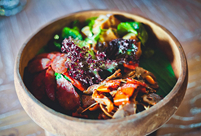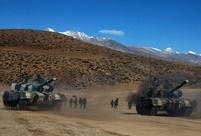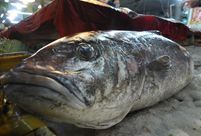 Army aviation: Adding wings to infantry
Army aviation: Adding wings to infantry
 Old photos of Chinese President Xi Jinping’s father and his families
Old photos of Chinese President Xi Jinping’s father and his families
 Bikini show in 2014 China Final of Miss Tourism World
Bikini show in 2014 China Final of Miss Tourism World
 Close-up view of August Aerobatic Team
Close-up view of August Aerobatic Team
 Goddesses married in 2014
Goddesses married in 2014
 Polar region photos raise worldwide awareness of global warming
Polar region photos raise worldwide awareness of global warming
 Get off at the last stop — Beijing Subway in vision
Get off at the last stop — Beijing Subway in vision
 Top 100 beauties in the world!
Top 100 beauties in the world!
 Gallery: Who is the most beautiful one?
Gallery: Who is the most beautiful one?
 If you like autumn, put your hands in the air!
If you like autumn, put your hands in the air!
BEIJING, Dec. 30-- The abrupt car purchasing restriction announced in Shenzhen on Monday left many residents startled in the southern metropolis.
Late in the afternoon, Shenzhen authorities suddenly and unexpectedly announced a restriction requiring prospective cars buyers to acquire license plates by lottery or auction.
The news resulted in several people attempting to panic buy cars that evening, but many failed to do so as traffic police and law enforcement preempted the panic buy and forcefully closed auto stores, witnesses said.
Shenzhen, the country's most congested metropolitan bordering Hong Kong, is the eighth Chinese city to adopt purchase restrictions following Beijing, Shanghai, Guangzhou, Tianjin, Guiyang, Shijiazhuang and Hangzhou to tackle rising congestion and pollution.
Chinese people are no strangers to car buying restrictions and traffic controls. During the 2008 Olympics, Beijing introduced a daily ban on half of the city's cars, determining who could drive on what day based on the license plates ending in odd or even numbers. The capital later relaxed the rule by keeping cars off the road one out of five weekdays and restricted car purchases.
Other major cities including Chengdu followed suit. Jinan said it would impose "temporary" bans depending on PM 2.5 density.
However, it should be noted that under such bans, property rights have been infringed upon, as cars in the capital cannot be used four days a month, which prompts more car purchases and could further damage the environment.
Such measures are controversial, but facing the capital's overloaded roads and choking smog, authorities are still reconsidering the rule allowing cars to drive on alternating days based on license plate numbers.
The purpose of the country's legislative body is to rationally approach a topic with consideration to various parties' interests. Balance should be sought between people's rights to vehicles and their demands for clean air and free traffic flow.
Traffic bans should proceed through legal channels, as was stressed by the Communist Party of China Central Committee, which says the government must run under the rule of law; powers should execute within the law; any official move should be endorsed by law.
While discussing draft revisions to the Air Pollution Law at last week's national legislative session, lawmakers harshly criticized an article attempting to pave the legal foundation for the current administrative car ban. They proposed deleting or changing sections of the article, which would give local governments the right to issue bans. Even if it remains in the law, compensation for infringed rights should be clarified.
In reality, the current law allows temporary traffic bans for "special occasions" including events, emergencies or poor weather. The current law is respectful of people's rights, whereas making the temporary administrative order a routine practice would overly restrict rights to property and the road.
More importantly, the government should prefer economic measures to bans in combating air pollution, such as raising emission standards and increasing the cost of car use through parking fees.
The decentralization of education and medical centers as well as the re-balancing of the industrial layout are also keys to tackling the congestion, rather than restrictions on vehicles.
Citing PM 2.5 readings recorded in early November when Beijing hosted the Asia-Pacific Economic Cooperation meetings, atmosphere expert Zhang Xiaoye said only ten percent of the pollution reduction came from the odd-and-even license plate vehicle restriction adopted temporarily by the city. The rest was the result of cuts in coal burning in neighboring regions.
Excessive use of "unclean" energy, not vehicle emissions, is the main contributor to the recurrent smog.
Efforts to legalize car restrictions need an open consultation process to fully protect people's rights. Local government should be armored with legal minds and respectful of the rule of law.
 Tempting Yunnan cuisine
Tempting Yunnan cuisine Joint anti-piracy drill
Joint anti-piracy drill PLA conducts tactical drill in Tibet
PLA conducts tactical drill in Tibet Beautiful Chinese woman
Beautiful Chinese woman Chestnut girl goes viral online
Chestnut girl goes viral online Time travel photos become a hit in military academies
Time travel photos become a hit in military academies Unknown 'monster' fish caught in Shandong
Unknown 'monster' fish caught in Shandong 20 years on: Relocated Three Gorges residents through lens
20 years on: Relocated Three Gorges residents through lens PLA HK Garrison veterans leave behind beautiful smiles
PLA HK Garrison veterans leave behind beautiful smiles Making sex safe
Making sex safe Gmail glitch fuels unnecessary speculation
Gmail glitch fuels unnecessary speculation Shenzhen imposes limits on purchases of new cars
Shenzhen imposes limits on purchases of new cars A Hongkonger working with mainland media confronted by both sides in Occupy Central reporting
A Hongkonger working with mainland media confronted by both sides in Occupy Central reportingDay|Week|Month